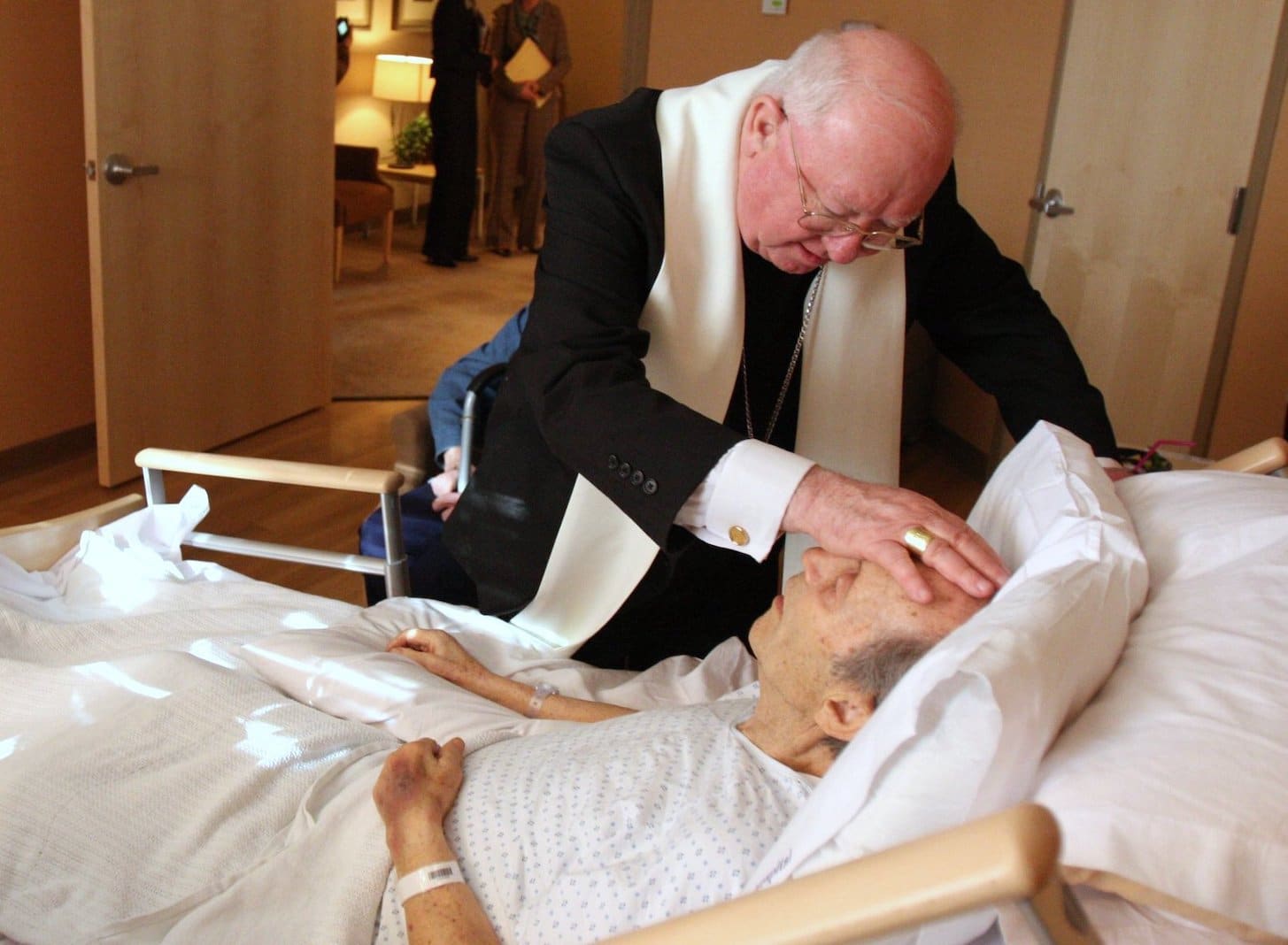(OSV News) — During February, Pope Francis’ monthly intentions asked the faithful to pray for the terminally ill — as well as their families — with the petition that they “receive the necessary physical and spiritual care and accompaniment.”
Such a plea is — for both those professionally and personally concerned with end-of-life ethics — increasingly urgent in America, where 2024 has seen suicide-enabling legislation introduced or pending in 18 state legislatures.
While those who support euthanasia and medically assisted suicide emphasize empowerment and control, Catholic opponents argue an undeniably dangerous and dystopian dimension has begun to emerge in the sometimes profit-driven realms of health care insurance and medicine: the cost-benefit ratio of prescribing death for terminal patients versus palliative care.
“What we’re seeing with various bills across our country is that we’re getting to the point that — in certain situations and states — any medical professional who upholds the Hippocratic Oath and implores the patient not to commit suicide, could be considered a felon,” Bishop Michael F. Burbidge of Arlington, Virginia, chair of the U.S. Conference of Catholic Bishops’ Committee on Pro-Life Activities, told OSV News.
“This is where it’s going,” Bishop Burbidge warned. “In a state like Oregon, insurance companies deny medical coverage for terminally ill patients — but offer medically assisted suicide as an alternative. This is the path that leads to a culture of death, instead of a culture of life.”
Legislation to legalize physician-assisted suicide moved rapidly in Virginia’s General Assembly session this year, triggering a Feb. 5 statement from Bishop Burbidge and fellow Virginia Bishop Barry C. Knestout of Richmond. The bill passed in the Senate, but ultimately stalled in the House of Delegates with a House committee voting on March 4 to punt the bill to the 2025 session.
“Those who are approaching the end of life should have access to high-quality medical and palliative care — not drugs to hasten their death,” Bishop Burbidge said. “Vigilance is required for all advocates, family members, and caretakers — more than ever.”
Other Catholic opponents of euthanasia and medically assisted suicide — sometimes labeled medical aid in dying — told OSV News their concerns and shared the efforts they are making to raise awareness around the country.
Every year gets a little more precarious
“Every year, it gets a little more precarious for us, as the proponents of the bill get themselves more organized, raise more money and pick up more sponsors,” said Dennis Poust, executive director of the New York State Catholic Conference.
In January 2023, the New York state Legislature introduced the “Medical Aid in Dying Act.” A Jan. 18-31, 2024, YouGov poll — commissioned by Death with Dignity — indicated 72% of New York state citizens, including 58% of Catholics, support legalizing medically assisted suicide.
Poust emphasized that “not everyone diagnosed with a terminal illness has a disability — but they will all become disabled as their illness progresses. There is grave concern that there will be coercion and pressure on people with disabilities to end their lives.”
Such concern is no longer purely theoretical either, Poust noted.
“You don’t have to look further than New York’s neighbors to the north, in Canada,” he explained. “They went from passing a bill five or six years ago, similar to New York’s, for people with terminal illnesses. Within a year or two, they expanded it to chronic illnesses that don’t have to be terminal. And now they’re on the verge of expanding it again to people with mental illness.”
Church’s teaching
The teaching of the Catholic Church is quite specific, with the Second Vatican Council condemning “euthanasia or wilful self-destruction” among the moral “infamies” that “poison human society” and are a “supreme dishonor to the Creator.”
Recent popes also have spoken strongly about the issues at stake. In his 1995 encyclical Evangelium Vitae (“The Gospel of Life”), St. John Paul II warned of such procedures, stating, “Here we are faced with one of the more alarming symptoms of the ‘culture of death.'”
Pope Benedict XVI lamented the same in a 2007 address to health care workers: “Today’s efficiency mentality often tends to marginalize our suffering brothers and sisters,” the pontiff said, “as if they were only a ‘burden’ and ‘a problem’ for society.”
In a 2014 address to Italian doctors, Pope Francis denounced the “false compassion” of euthanasia.
However, the Catholic Church also says it can be morally acceptable for people to forgo “extraordinary” medical treatment, as the Catechism of the Catholic Church notes: “Discontinuing medical procedures that are burdensome, dangerous, extraordinary, or disproportionate to the expected outcome can be legitimate; it is the refusal of ‘over-zealous’ treatment. Here one does not will to cause death; one’s inability to impede it is merely accepted.”
More states’ legislation
In Arizona, both medically assisted suicide bills expired in the 2024 legislative session before being referred to committee.
“We’ll see what happens in the elections — things could change,” cautioned Ron Johnson, executive director of the Arizona Catholic Conference.
“When care is expensive and killing is cheap, which do we think will ultimately prevail?” asked Jason Adkins, executive director and general counsel of the Minnesota Catholic Conference. “Protecting the choices of those who want assisted suicide will ultimately endanger the health care choices of others.”
Minnesota’s medically assisted suicide bill comes up for a vote before the House Public Safety Finance and Policy Committee March 7.
“The proposed legislation requires all doctors and APRNs (Advanced Practice Registered Nurses) who serve terminal patients to offer assisted suicide as an option as part of their standard of care,” said Adkins, warning that such a prerequisite “will harm the doctor-patient relationship and undermine health care delivery and access, especially for the most vulnerable in our communities.”
Oregon was the first state to legalize physician-assisted suicide when its Death with Dignity Act went into effect in 1997.
Nine other U.S. states in addition to Oregon allow medically assisted suicide by either statute or court decision — California, Colorado, Hawaii, Maine, Montana, New Jersey, New Mexico, Vermont and Washington — as well as the District of Columbia.
Approval in Gallup poll
A 2020 Gallup poll found 74% of U.S. adult respondents believe “doctors should be allowed to end the life of a patient with an incurable disease ‘by some painless means’ if the patient and the patient’s family requests it.”
Gallup noted that 61% of Americans favor “doctor-assisted suicide for patients living in severe pain with an incurable disease.”
Even among those who attend church weekly, 55% support euthanasia, while 39% support doctor-assisted suicide.
The thin line between euthanasia and medically assisted suicide is defined by who administers a lethal dose of drugs. In euthanasia — currently illegal throughout the United States — medical personnel actively kill the patient under certain criteria; in medically assisted suicide, the physician prescribes the lethal drugs to the patient, but doesn’t administer them directly — the patient does.
Properly teach and catechize
In New Jersey, a physician-assisted suicide law has been in effect since 2019 — and is poised to remain so.
“In the current political climate in the state, I think we are going to see this law in effect for the foreseeable future,” said James King, executive director of the New Jersey Catholic Conference.
For King, facing the issue of physician-assisted death has been intensely personal. When his mother was diagnosed with aggressive terminal cancer, one doctor was chillingly specific concerning how long King’s mother had to live.
“She was advocating for me — or suggesting to me — that I withhold food and hydration from my mom’s care,” King shared. He refused, and the physician quickly asked if he was Catholic. Upon his affirmative response, the doctor informed him, “Well, you know the Holy Father, the pope, changed all the rules about this a couple of years ago — you can withhold nutrition and hydration.” King then pulled out his business card and gave a quick catechesis session.
“That’s the reason we need to raise awareness,” King observed. “You’re already seeing where medical professionals are willing to go.”
With the extra time allowed by palliative care, King’s mother was able to see his youngest son, her grandson, receive his first Communion.
“If a Catholic doesn’t have that information, they could have heard that doctor — saying things with the best intentions, very compassionately, saying the Holy Father changed that — and they could have believed that, and followed that advice,” King said. “That’s the responsibility we have, as Church, to help properly teach and catechize the faithful as they face these critical decisions in their lives — for themselves and their loved ones.”





